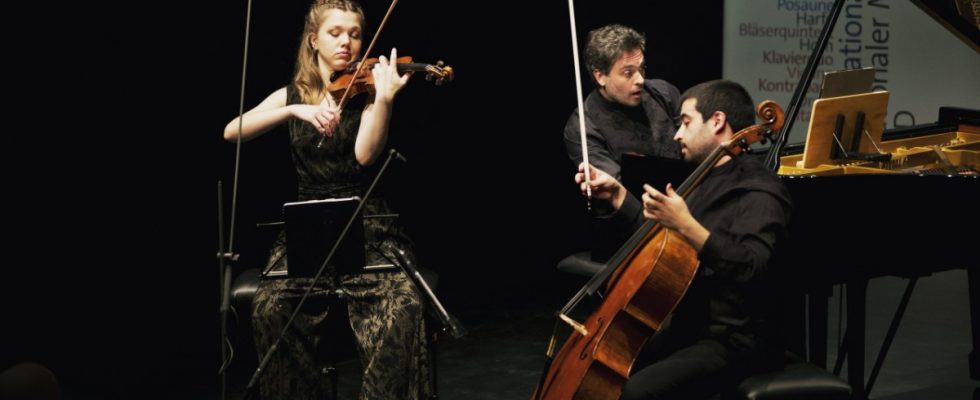Franz Schubert’s Piano Trio in E flat major D 929 is a lonely peak when it comes to violin, viola and piano. So it’s no wonder that in the final of this subject at the ARD music competition in the Prinzregententheater, the French were at the beginning Trio Panthoum and at the end this Trio Orelon performed this work, albeit in very different interpretations. At first it was played without the cuts in the finale, which seriously disrupted the proportions, which Schubert had to make for printing, and with all the intended repetitions in the exposition and scherzo. The other time, in a condensed form and without any repetitions!
The choice of versions of different lengths also went hand in hand with the character of the music-making: at the beginning, in addition to a wide breath for the “heavenly lengths” (Schumann on the C major symphony), a captivating French “Clarté” dominated. It was combined with a composure of expression that should not be confused with sobriety or neutrality. In the end, there was a passionate design with enormous, but always well-dosed, expression in the concentration. She went straight to the heart. Here the shortened finale, without the third reminiscence of the dreamlike theme of the slow movement, took on something shimmering and flowing.
Both attitudes, which are not least stylistically contrasting, do the work justice in very different ways. But of course it offered Trio Orelon The more immediate approach, the tone of the violin and cello had more color and soul, and conversely the piano was more reserved and usually accompanied rather than taking the lead. Conversely, Virgile Roche’s crystal-clear touch and his fluid parrying were incredibly fascinating. He was next to his string colleagues Trio Pantoum definitely an equal, sometimes even dominant partner.
The trio Orelon not only won the final – but also won the audience award
Because Marco Sanna on the piano, Judith Stapf (violin) and the cellist Arnau Rovira also played Hans Werner Henze’s twelve-tone chamber sonata from 1948 outstandingly, exactly between the glass bead playing of the French and the somewhat superficial expression of the Amelio Triosthey won first place and also the audience award.
Unfortunately, the French only ended up in third place, while Philipp Kirchner, piano, violinist Johanna Schubert and cellist Merle Geißler from Amelio Trio probably also thanks to their outstanding Beethoven (op. 70/1) in the semifinals they won second prize. For the finale they chose Schubert’s B major Trio D 898. Whenever violin and cello played together gently and quietly, such as in “Andante un poco mosso” or in the Trio of the Scherzo, one was delighted. But there were also places where the full-bodied, rich tone of the violin came to the fore and disturbed the balance somewhat, although Merle Geißler on the cello confidently countered it. According to the French, this emphatic music-making was the other extreme, whereas Schubert’s music reveals its full beauty when you simply let it happen.

